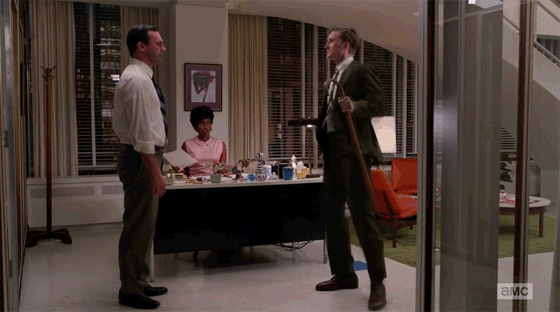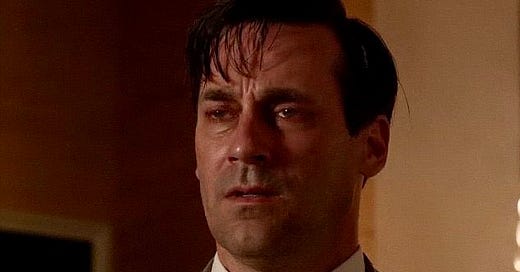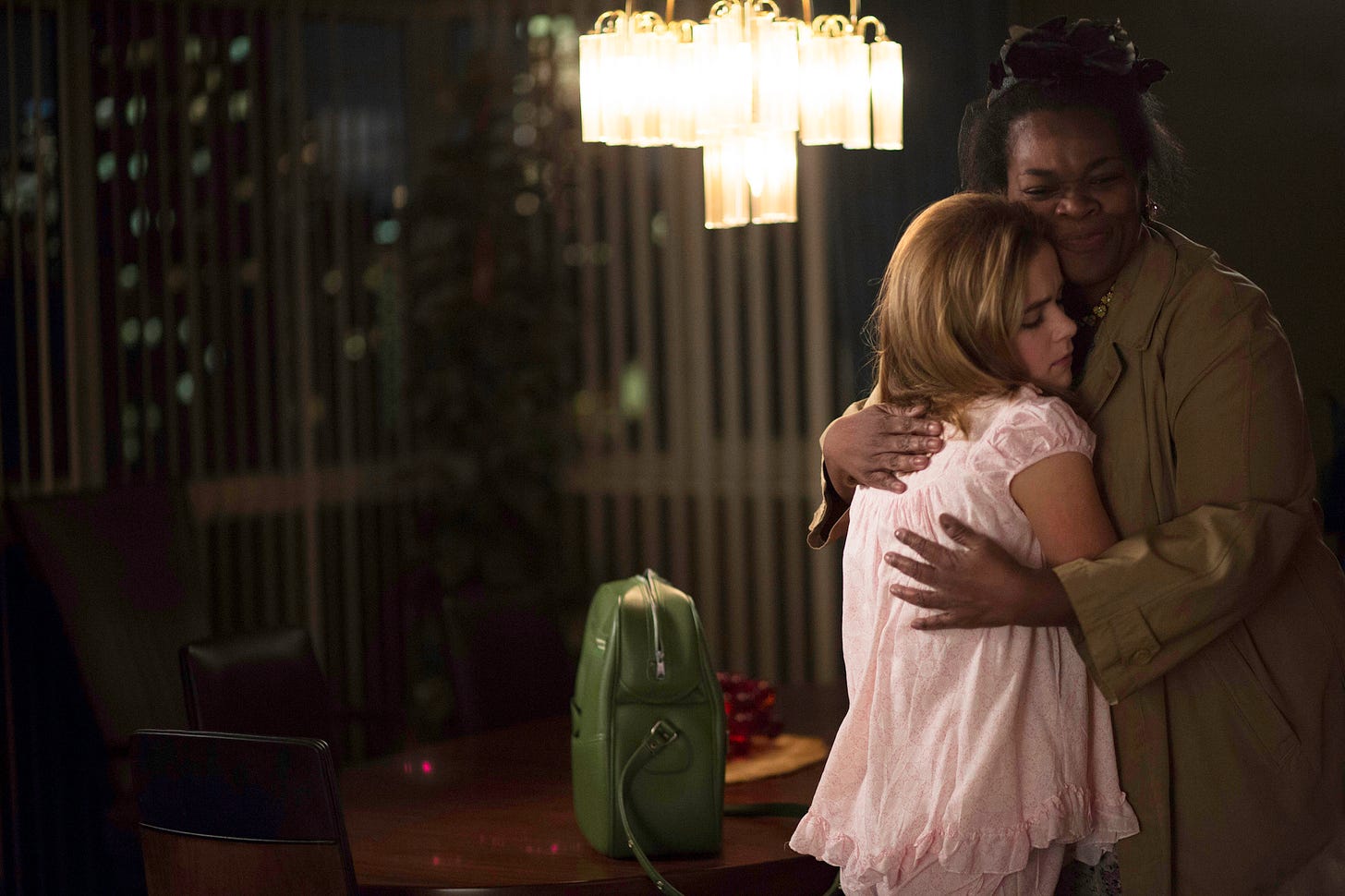Season 6: Episode 8
“The Crash”
Written by Jason Grote & Matthew Weiner
Directed by Michael Uppendahl
Setting: June 1968
For the most part, I know what I am getting into when I revisit Mad Men.
I understood the banality of season 2, I enjoyed the bliss of Season 4’s non-stop greatness, and I had my mallet ready to beat myself over the head with at the Looney Tunes insanity of Season 6.
That’s why I was surprised to read that this episode, “The Crash,” was initially one of the worst-reviewed episodes of the show. Critics saw Don Draper’s descent into drugs as unpleasant and unnecessary.
Who tunes into Mad Men to see New York’s smoothest ad man looking like THIS!
While more revered now, I was shocked by the largely negative backlash to this episode. Drugs and their effect on American society are a key part of understanding the maelstrom of the 1960s. Pumping speed into a man who hallucinates ghosts just from getting gas at the dentist’s was, of course, a BAD IDEA!
It was a bad idea for everyone!... Well, at least it was entertaining for Kenny.

“The Crash” is an unforgettable episode that many fans wished to forget immediately. I could not understand why this was until I approached the episode with my mind focused on one event.
Vietnam. Watching this episode evokes the same feelings Americans had while the Vietnam War was raging on.
Don Draper’s unending battle to deliver a winning pitch for a car company is his Vietnam.
The agency has gone from Jaguar to Chevy and won nothing in the process. They have instead lost their sanity and what little morals they had. The firm knows this is unsustainable but is choosing self-destruction over defeat.
Success doesn’t define them; pain and suffering do.

After being prescribed a “perfectly safe” drug cocktail to improve his productivity, Don becomes obsessed with finding the perfect pitch and is convinced it has already been done in the past.
He is not looking ahead to the future because he knows that the battle is lost. His only comfort lies in a past where there was no Vietnam, no car account to torment him.
This longing for yesterday takes Don even further into his past, back to the 1940s when he lived in a brothel.

Times may be tough, but for Don Draper, yesterday will always be worse.
Don’s first experience with hard drugs takes him back to the original addiction. His other unending battle.
Women.
Don was once a scared, unfortunately bowl-cut-styled kid who knew nothing about the world except its suffering. He was taught young that he could indulge in its vices and numb the suffering. Even if he was punished, that was just more all too familiar suffering.
Trauma eats trauma.
Don Draper sees nothing in life as necessary. Victory with honor is a joke to him. Move forward and numb the pain.
Sadly, what numbs the pain most is in the past. Places and people that no longer exist. There was a time when the suffering felt unique. Now it is mundane. Other people can see it in him.

Don chooses to exit the battle. Call him back after you win the war.
He knows they never will.
This may seem wise, but it is actually selfish.
Don Draper simply wants his suffering to feel unique again. He cannot bear to be just another broken heart that others feel pity for.
There was a time when that felt unique. No longer.
The world is so painful that it makes life easier to simply believe what we are told. Why question anything?
There certainly are some things you should question. Taking drugs? Yes, of course. A random woman showing up in the middle of the night and claiming to be your grandmother? Yes... of course.
In what most viewers likely assumed would be the strangest plotline of the season (not even close, we’ve still got five more episodes for Bob Benson to play), a woman breaks into the Draper apartment by claiming to be the woman who cared for Don as a child.
Sally immediately questions the stranger, but given the strangeness of the situation, her best option is to accept that this as reality. No adults are there to protect her, and she trusts her “grandmother” so easily because she never learned how to trust adults.
Don never taught her how.

This is the part of the episode that does not sit well with me, not so much for what the show does but for what it doesn’t do.
The primary B-plot of the episode is focused on a black woman robbing a white family and escaping through manipulation and threats.
I’ve aired this criticism before. Dawn, the show’s main black character, is a background player most of the time. The potential for her to take a larger role is always present but never fully explored. It stings to have this B-plot about a woman of color robbing a white family receive focus when the show could be doing so much more for its characters of color.
I understand why they did the story, just not why it got focus where other stories did not.
The 1960s were a jarring and uncomfortable time, even without the drugs. We can choose to look back with nostalgia, but that nostalgia can become a unique pain.
Longing for the past can be weaponized against you. The burglar used this to her advantage. She embodied a past that never existed, a loving grandmother who just wanted to give Sally Draper a hug.
When you long for the past, are you longing for something that was never real?
Do you want the war to be over, or do you want life to be like it was before the war?
Before the crash.







